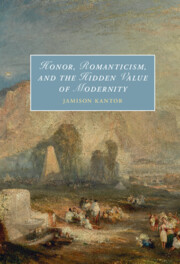Book contents
- Honor, Romanticism, and the Hidden Value of Modernity
- Cambridge Studies in Romanticism
- Honor, Romanticism, and the Hidden Value of Modernity
- Copyright page
- Contents
- Figures
- Acknowledgments
- Introduction
- Chapter 1 Soliloquies in Praise of Chivalry
- Interlude
- Chapter 2 “Say, What Is Honour?”
- Chapter 3 Full Faith and Credit
- Interlude
- Chapter 4 Black in Character as in Complexion
- Postlude
- Notes
- Bibliography
- Index
- Cambridge Studies in Romanticism
Chapter 4 - Black in Character as in Complexion
Abolitionist Media and the Honorable Body of Mary Prince
Published online by Cambridge University Press: 23 February 2023
- Honor, Romanticism, and the Hidden Value of Modernity
- Cambridge Studies in Romanticism
- Honor, Romanticism, and the Hidden Value of Modernity
- Copyright page
- Contents
- Figures
- Acknowledgments
- Introduction
- Chapter 1 Soliloquies in Praise of Chivalry
- Interlude
- Chapter 2 “Say, What Is Honour?”
- Chapter 3 Full Faith and Credit
- Interlude
- Chapter 4 Black in Character as in Complexion
- Postlude
- Notes
- Bibliography
- Index
- Cambridge Studies in Romanticism
Summary
Known for its brutal descriptions of punishment – and the resistance of its narrator – The History of Mary Prince is usually read as a slave narrative that argues for abolition by way of affective appeals. While its explicit set pieces of violence and sexual humiliation played upon the sentiments of British readers, provoking an instinctual repulsion towards slavery, these scenes may have also encouraged readers to identify the enslaved as permanently degraded. Mary Prince and her editor Thomas Pringle, however, challenge this acceptable debasement of slaves by connecting the concept of honor to Prince’s physical character. In doing so, the History addresses a prejudice long-held by both abolitionists and colonialists towards the black female body and demonstrates how Romantic abolitionism could pivot from the bourgeois liberal ideal of freedom – or the negative right of non-restraint – to dignity, a positive, material affirmation of social worth. A concluding section treats the History as a prospectus – or, perhaps, Afrofuturist manifesto – for the political subject that can exist outside of the state, capitalist institutions, and even the bounds of recognizable sovereignty.
- Type
- Chapter
- Information
- Honor, Romanticism, and the Hidden Value of Modernity , pp. 106 - 133Publisher: Cambridge University PressPrint publication year: 2023

